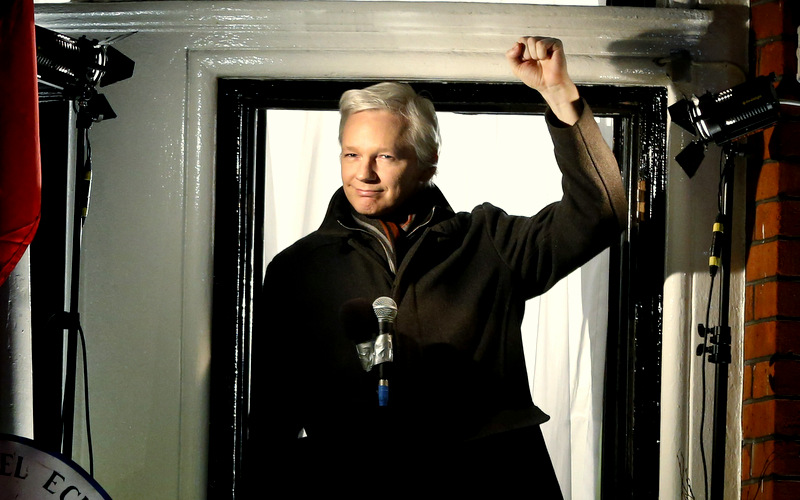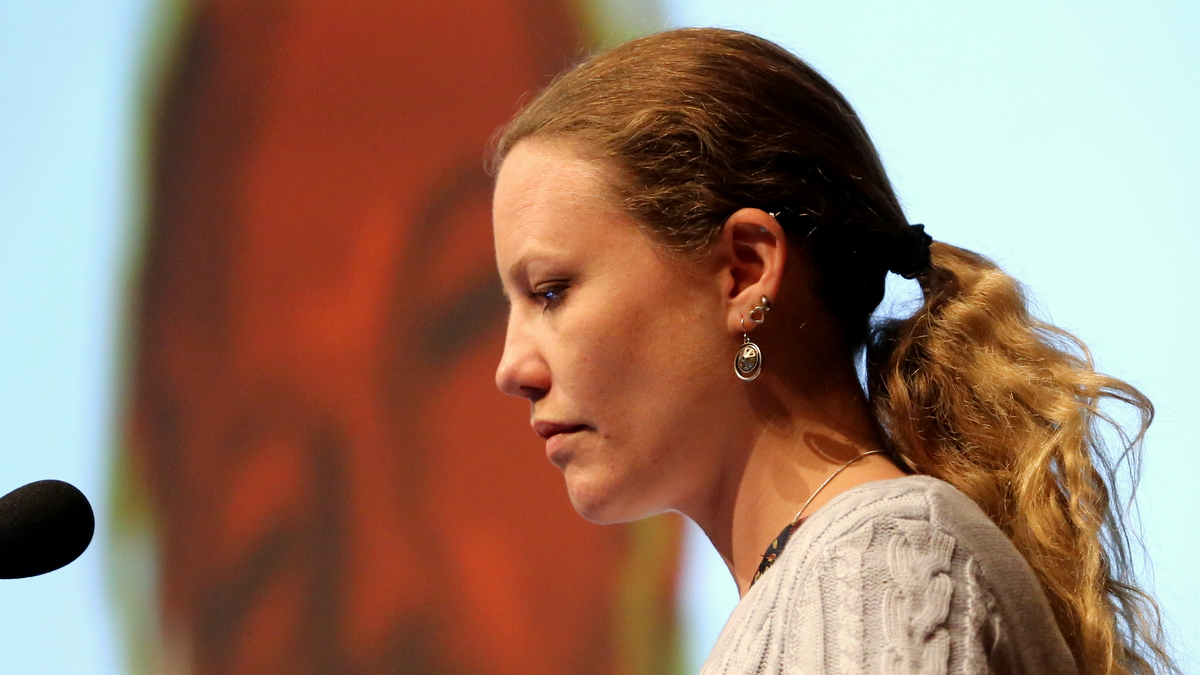James Risen
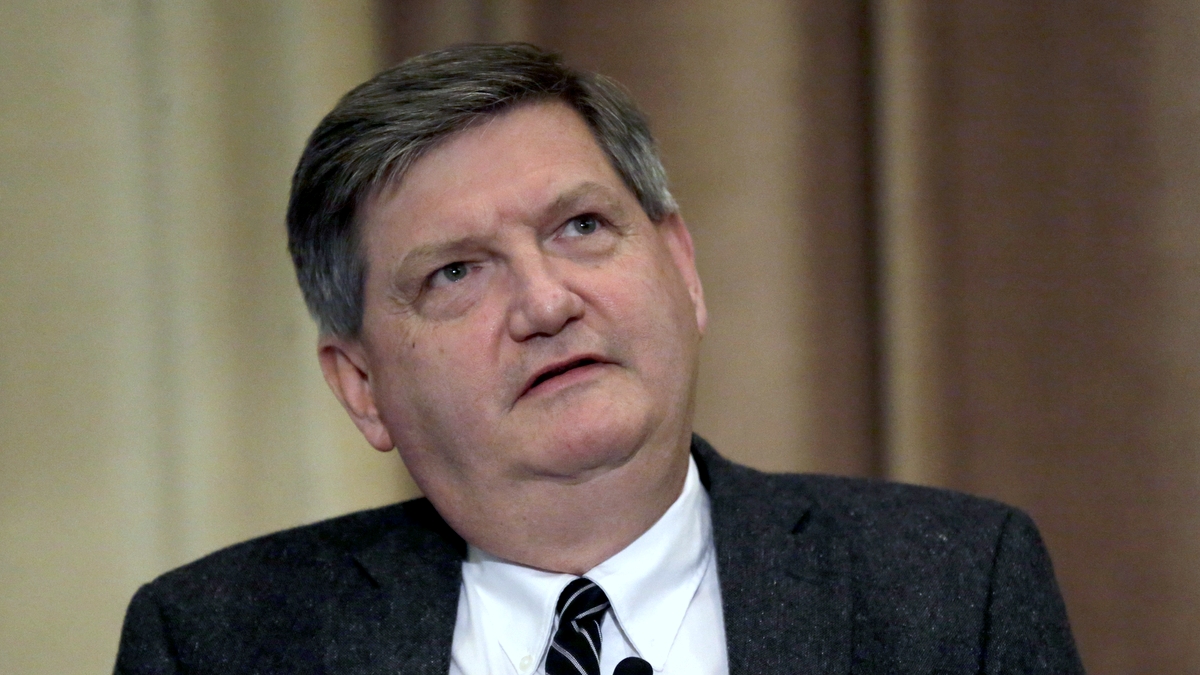 James Risen, Pulitzer Prize winning reporter with the New York Times, addresses a luncheon at the Associated Press Media Editors conference in Chicago. The Justice Department has ruled out forcing Risen to divulge his source in the upcoming trial of a former CIA officer accused of leaking classified information, a person familiar with the matter said Friday, Dec. 12, 2014. (Photo: Charles Rex Arbogast/AP)
James Risen, Pulitzer Prize winning reporter with the New York Times, addresses a luncheon at the Associated Press Media Editors conference in Chicago. The Justice Department has ruled out forcing Risen to divulge his source in the upcoming trial of a former CIA officer accused of leaking classified information, a person familiar with the matter said Friday, Dec. 12, 2014. (Photo: Charles Rex Arbogast/AP)
On Aug. 14, 2014, in a general statement to the press concerning the situations in Ferguson, Missouri, and Iraq, President Obama spoke against the rash of journalist arrests during the protest of the killing of unarmed black teenager Michael Brown by Ferguson police officer Darren Wilson.
“Here, in the United States of America, police should not be bullying or arresting journalists who are just trying to do their jobs and report to the American people on what they see on the ground,” Obama said. “Put simply, we all need to hold ourselves to a high standard, particularly those of us in positions of authority.”
Despite this sentiment, the administration’s treatment of James Risen, 59, reflects an underlying disrespect for “inconvenient journalism.” Risen, who made his name reporting on government misconduct, including reporting on the government’s surveillance of international communications starting or ending in the U.S. and the government’s tracking of money transfer records in order to detect terrorist financiers, became a quick target for the White House. On at least one occasion, the George W. Bush administration publicly decried Risen’s reporting to be “misleading.”
Risen’s book, “State of War: The Secret History of the CIA and the Bush Administration,” was released in January 2006. In the book, Risen makes strong statements about how the CIA — either through misguided goals or simple buffoonery — contributed to the international political environment seen in Bush’s second term. For example, Risen details the Bill Clinton-era Operation Merlin, which allegedly was meant to fatally stall Iranian nuclear development by providing Iran — via a double agent — intentionally flawed nuclear warhead blueprints. The idea was that the Iranians were to build the weapon according to the blueprints, thus utilizing their limited resources on what basically amounted to a dud. It would take the Iranians years to recover if all went according to plan. However, the plan backfired when the Russian scientist the CIA chose as an intermediary noticed the errors on the plans and pointed them out to the Iranians. With the Iranians now able to avoid the trap, the plans actually served to advance the Iranian nuclear program by years.
In another section, Risen alleges that the U.S. and the CIA under the Bush administration were responsible for making Afghanistan the supplier of 80 percent of the world’s heroin.
Further, he writes, «Several of the Iranian [CIA] agents were arrested and jailed, while the fate of some of the others is still unknown,” concerning an event in which a CIA official in 2004 accidentally sent an Iranian agent an encrypted electronic message containing data that could identify «virtually every spy the CIA had inside Iran.” The Iranian agent turned the information over to Iranian intelligence.
Following the filing of a complaint concerning racial discrimination practices in the CIA, Jeffrey Alexander Sterling was stripped of his security clearance and terminated when two attempts to settle the claims failed. At roughly the same time that the 4th Circuit Court of Appeals was hearing Sterling’s case, the federal government intercepted several emails and telephone calls in which Sterling allegedly discussed national defense information with an unauthorized individual. Several of these telephone calls were said to be traced to Risen.
Risen was subpoenaed in 2008 to reveal in court his source for “State of War.” This presents an ethics violation for journalists, as sources would be unwilling to present sensitive information to a journalist who would reveal the source to authorities. Risen fought the original subpoena until its expiration a year later. In an unusual move, the Obama administration refused to allow the issue to die and renewed the subpoena in 2010. In June 2014, the U.S. Supreme Court refused to hear Risen’s appeal, formally ending the journalist’s legal options and leaving him to choose between serving time in jail or revealing his source.
Since the Supreme Court’s decision, the number of calls from free press groups and journalists for the Justice Department to drop the subpoena have grown exponentially. Should the federal government force Risen to testify, the government would effectively chill government whistleblowing and watchdog journalism in ways that are difficult to estimate.
“Transparency and openness are not a matter of issuing more press releases and providing photo ops. It’s a deep, unshakable understanding of the need for revelations in the press even when they are embarrassing and at times downright harmful, the conviction that they are indispensable to a fully functioning democracy,” journalist John Darnton wrote in support of Risen on Rootsaction.org in August 2014.
While the Justice Department announced last year a review of its policies toward obtaining information from the news media, Risen’s subpoena remains active. The Obama administration is in a difficult position: betraying the intelligence community by failing to aggressively go after whistleblowers and classified information leakers, or betraying the media by forcing a journalist to reveal his sources — possibly setting precedence.
It is unclear which direction the administration will go.
John Kiriakou
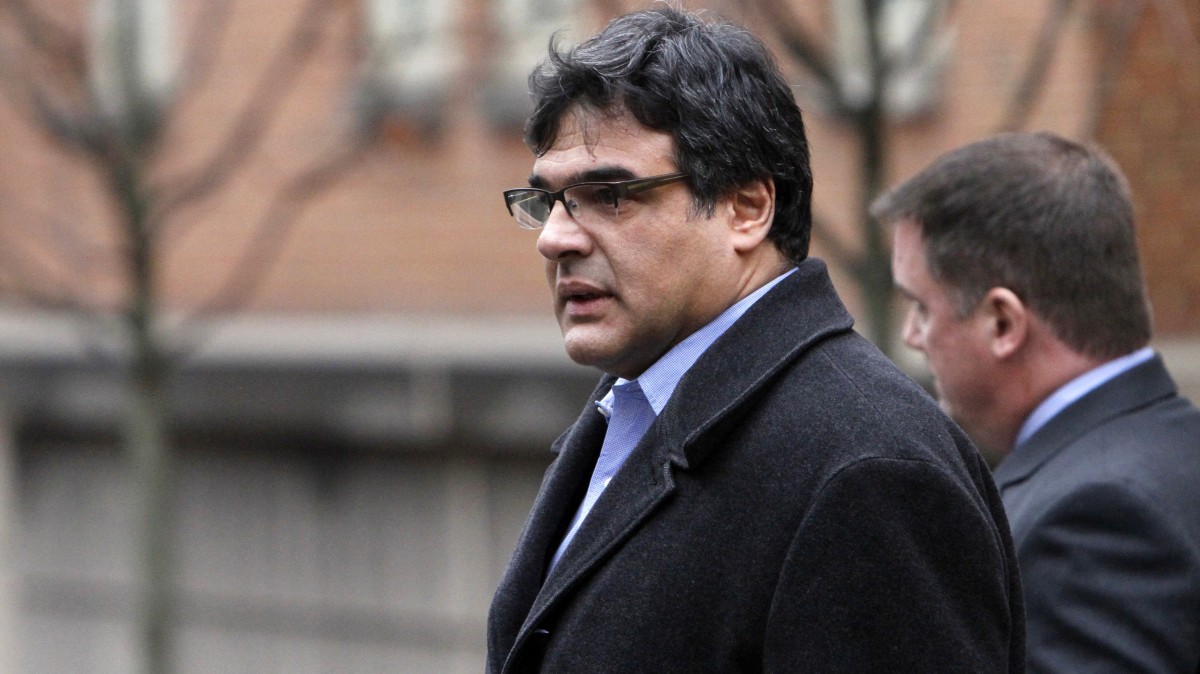 Former CIA officer John Kiriakou, left, and his attorney John Hundley, leave federal court in Alexandria, Va., Monday, Jan. 23, 2012. (Photo: Jacquelyn Martin/AP)
Former CIA officer John Kiriakou, left, and his attorney John Hundley, leave federal court in Alexandria, Va., Monday, Jan. 23, 2012. (Photo: Jacquelyn Martin/AP)
In hindsight of revelations from the Senate Intelligence Committee’s “torture report” and President Obama’s acknowledgment that the U.S. did indeed torture al-Qaida detainees, it is difficult to remember that the U.S. spent nearly a decade denying these very claims. However, former CIA agent John Kiriakou, 50, began serving a 30-month sentence in relation to these denials on Jan. 25, 2013.
He is only the second CIA employee to be imprisoned for violating the Intelligence Identities Protection Act. And he is the only government employee — CIA or otherwise — to serve any time for the CIA’s enhanced interrogation program.
In a July 2010 interview with ABC News, Kiriakou claimed that he participated in the capture and questioning of Osama bin Laden aide Abu Zubaydah. Based on information relayed to Kiriakou from CIA associates, Kiriakou told ABC News that it only took a single waterboarding instance to extract the needed information from Zubaydah.
Speaking to ABC News’ Brian Ross, Kiriakou said:
“He resisted. He was able to withstand the water boarding for quite some time. And by that I mean probably 30, 35 seconds, which was quite some time. And a short time afterwards, in the next day or so, he told his interrogator that Allah had visit him in his cell during the night and told him to cooperate because his cooperation would make it easier on the other brothers who had been captured. And from that day on he answered every question just like I’m sitting here speaking to you.”
Points in Kiriakou’s story have since been refuted — for example, it was revealed in a Justice Department legal memorandum that Zubaydah was waterboarded at least 83 times and little valuable information was extracted via these actions. Yet Kiriakou’s interview marked the first time that a member of the intelligence community admitted that the U.S. had committed acts of torture.
In 2012, Kiriakou was charged with repeatedly disclosing classified information to journalists. Among the disclosures federal prosecutors inventoried were the name of a covert CIA officer and information regarding the classified activities of fellow CIA employee Deuce Martinez, as well as Kiriakou’s failure to fully disclose the contents of his published book to the CIA. In total, Kiriakou was indicted on three charges of violating the Espionage Act, one charge of violating the Intelligence Identities Protection Act, and one count of making false statements to the Publications Review Board of the CIA.
To avoid having to force the journalists he worked with to testify, Kiriakou pleaded guilty to one count of violating the Intelligence Identities Protection Act for passing controlled information to the media. Kiriakou’s case has since been used as an example of how the White House’s prosecution of whistleblowers has had a chilling effect on the coverage of national security issues.
However, reflections on Kiriakou’s interview with ABC News have painted him as a waterboarding apologist, as his description of the procedure made the tactic seem more benign than most experts agree it actually is. Despite this, Kiriakou has professed his strong belief that the practice is wrong and has done irreparable harm to the United States’ reputation.
“One thing that I think most everybody has missed is, we knew about the waterboarding, we knew about the cold cells, we knew about the loud music and the sleep deprivation,” Kiriakou told The Intercept in a January 2015 phone interview from a federal prison in Pennsylvania.
He continued:
“We knew about all the things that have been ‘approved’ by the Justice Department. But what we didn’t know was what individual CIA officers were doing on their own without any authorization. And I would like to know why those officers aren’t being prosecuted when clearly they’ve committed crimes and those crimes were well documented by both the CIA and the Senate Committee of Intelligence.”
Update (Feb. 4 2015): John Kiriakou was released from Loretto Federal Correctional Institution on Feb. 3. He will serve the remainder of his 30-month sentence for disclosing the CIA’s torture program under house arrest. Kiriakou’s sentence officially concludes in August 2015.
John Kiriakou’s release was announced on his Twitter account:
Free at last. Free at last. Thank God Almighty. I'm free at last. MLK Jr (and John Kiriakou). pic.twitter.com/hoPgbjFyAZ
— John Kiriakou (@JohnKiriakou) February 4, 2015
Michael Hastings
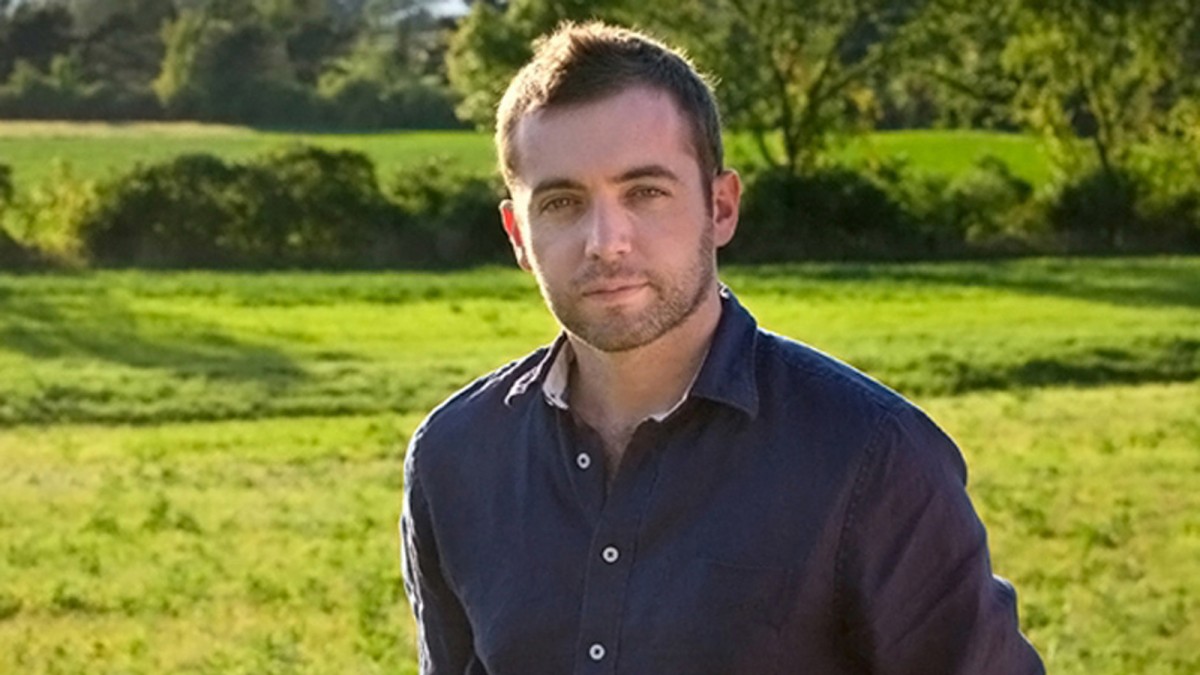 Award-winning journalist and war correspondent Michael Hastings. (Photo: AP/Blue Rider Press/Penguin)
Award-winning journalist and war correspondent Michael Hastings. (Photo: AP/Blue Rider Press/Penguin)
On June 18, 2013, acclaimed journalist Michael Hastings, 33, died after crashing his Mercedes C250 Coupe into a palm tree at maximum speed. The unusual nature of the crash — one witness described seeing sparks and flames coming off of Hastings’ car before it hit the tree — led many to wonder if someone had been acting to silence the reporter once and for all.
Hastings came into the public spotlight following his 2010 Rolling Stone article “The Runaway General,” in which Hastings profiled Gen. Stanley McChrystal, then-commander of NATO’s International Security Force in Afghanistan. When the 2010 eruptions of Iceland’s Eyjafjallajökull grounded all international air traffic in Europe, Hastings and the general were forced to share a bus to Berlin. This gave Hastings the opportunity to overhear unguarded conversations between the general and his staff.
Hastings’ article included comments that were critical of and contemptuous to the president’s office and to the military’s civilian leadership. Despite McChrystal’s apology, the general was recalled back to Washington, where President Obama accepted his resignation.
Writing critically about the Obama administration, Hastings released internal reports showing that the Department of Homeland Security was keeping tabs on Occupy Wall Street, which asserted that while peaceful, “[the] growing support for the OWS movement has expanded the protests’ impact and increased the potential for violence. While the peaceful nature of the protests has served so far to mitigate their impact, larger numbers and support from groups such as Anonymous substantially increase the risk for potential incidents and enhance the potential security risk to critical infrastructure.”
Yet Hastings’ most significant piece of work was on the disappearance of Army Sgt. Bowe Bergdahl, who was captured and held by the Haqqani network in Afghanistan from June 2009 until May 2014. After writing an email to his parents expressing his disgust with the Army and the United States’ mission in Afghanistan, Bergdahl allegedly left a note on his bunk indicating that he had gone off to start a new life. He was reportedly captured either after falling behind on a patrol or after being ambushed after drinking off-base. Hastings took up the story after Bergdahl’s parents stopped talking to the press on the heels of “subtle pressure” from the military.
The publication of Hastings’ story on Bergdahl greatly agitated the administration, which had taken precautions to ensure that members of Bergdahl’s unit signed nondisclosure agreements prior to the publication of Hastings’ article that prevent them from discussing Bergdahl’s disappearance or the subsequent search. The assumption that the continued publication of details concerning the case would hamper efforts to retrieve Bergdahl led many to suspect that the FBI was actively investigating Hastings, according to a partially-redacted FBI file received through a Freedom of Information Act request by investigative journalist Jason Leopold and Ryan Shapiro, an MIT doctoral student once called the “most prolific” requester of FOIA documents.
“The article reveals private email excerpts, from [redacted] to his parents. The excerpts include quotes about being ‘ashamed to even be American,’ and threats that, ‘If this deployment is lame, I’m just going to walk off into the mountains of Pakistan,’” read the FBI file. “The Rolling Stone article ignited a media frenzy, speculating about the circumstances of [redacted] capture, and whether US resources and effort should continue to be expended for his recovery.”
At the time of his death, Hastings was researching what he called “a big story” that required him to “go off the radar.” It was reported that Hastings was to profile John Brennan, the director of the CIA. While no foul play was determined in Hastings’ death, the circumstances and timing of the crash — he had contacted lawyers with WikiLeaks a few hours prior — have prompted suspicions of a possible conspiracy.
As reported by The Huffington Post, Richard Clarke, former U.S. National Coordinator for Security, Infrastructure Protection, and Counterterrorism, said, «There is reason to believe that intelligence agencies for major powers» — including the United States — know how to remotely seize control of a car.
«What has been revealed as a result of some research at universities is that it’s relatively easy to hack your way into the control system of a car, and to do such things as cause acceleration when the driver doesn’t want acceleration, to throw on the brakes when the driver doesn’t want the brakes on, to launch an air bag,” Clarke continued.
«So if there were a cyber attack on the car — and I’m not saying there was, I think whoever did it would probably get away with it.»
Aaron Swartz
 In this Jan. 30, 2009 photo, Internet activist Aaron Swartz poses for a photo in Miami Beach, Fla. Swartz was found dead Friday, Jan. 11, 2013, in his Brooklyn, N.Y., apartment, according to Ellen Borakove, spokeswoman for New York’s medical examiner. (Photo: The New York Times/Michael Francis McElroy)
In this Jan. 30, 2009 photo, Internet activist Aaron Swartz poses for a photo in Miami Beach, Fla. Swartz was found dead Friday, Jan. 11, 2013, in his Brooklyn, N.Y., apartment, according to Ellen Borakove, spokeswoman for New York’s medical examiner. (Photo: The New York Times/Michael Francis McElroy)
Aaron Swartz may not fit into anyone’s image of a journalist, but his work helped to promote citizen journalism and the freedom to communicate online. His 2013 suicide brought to the nation’s attention the heavy-handed approach the federal government has taken to prosecute computer crimes — an approach that has been used to effectively censor a number of other journalists — and prompted debate about whether knowledge should be commoditized.
At the time of his death, Swartz, 26, was recovering from the news that the office of the U.S. Attorney for Massachusetts rejected a counter-offer to the plea bargain the prosecution offered Swartz. Swartz was facing up to 50 years in prison and $1 million in fines in what most critics, including former White House Counsel John Dean, characterized as “overcharging” and “overzealous” prosecution. Swartz, an advocate for open access to knowledge, sought to download a number of academic journals from JSTOR, then offer free access to that information online — a violation of the service’s terms of use. At the time, Swartz had a JSTOR account because he was a research fellow at Harvard University, and his use of MIT’s “open campus” for accessing JSTOR was permitted.
Swartz had previously attempted to fight against the federal government’s charging for access to federal court documents by attempting a similar stunt with the federal court’s PACER system.
“Stealing is wrong,” Swartz wrote on his blog, as reported by The New Yorker. “But downloading isn’t stealing.”
He continued:
“If I shoplift an album from my local record store, no one else can buy it. But when I download a song, no one loses it and another person gets it. There’s no ethical problem. The evidence that downloading hurts sales is weak, but even if downloading did hurt sales, that doesn’t make it unethical. Libraries, video rental places, and used book stores (none of which pay the artist) hurt sales too. Is it unethical to use them?”
Although the Middlesex district attorney’s office filed to have the case declared nolle prosequi — or to be set aside indefinitely due to the prosecutor’s refusal to prosecute the case — those familiar with the case argued that the U.S. Attorney sought to make a statement with the Swartz case. This, despite the fact that JSTOR sought no remedies — JSTOR and Swartz already had a civil remedy plan in place prior to the prosecution — and MIT, where Swartz downloaded the journal through illegal access to an unlocked controlled access wiring closet, was not publicly seeking any damages from Swartz.
It was alleged, however, that MIT had blocked any plans for Swartz not to receive prison time. In the MIT report on the Swartz issue, MIT took the position that the university took no position either for or against jail time and did not consider itself a damaged party in this case.
On the surface, Swartz’s prosecution and death seemed to solve nothing. The amendment to the Computer Fraud and Abuse Act — which would remove terms of service violations as prosecutable acts — and the Fair Access to Science and Technology Research Act failed to pass. U.S. Attorney Carmen Ortiz was able to downplay her office’s involvement in the death by saying it was never her office’s intention to prosecute Swartz to the maximum sentence (despite statements from Assistant U.S. Attorney Stephen Heymann to counter this). Even after numerous congressional hearings, no one is any closer to figuring out why the federal government pursued the prosecution so vigorously when local authorities waived off prosecution, one of the injured parties did not seek damages, and the other injured party read itself as being neutral to the situation.
The loss of this man — who was a member of the working group that created the RSS 1.0 web syndication specification at age 14, invented the RDF/XML media type at 15, co-created the Markdown web language before he started college, and created Infogami — made the nation sensitive to the actions of the federal government and played a significant role in slowing down the Obama administration’s prosecution of computer crimes.
Edward Snowden
 Edward Snowden receives the Sam Adams award for Intelligence Integrity in Moscow.
Edward Snowden receives the Sam Adams award for Intelligence Integrity in Moscow.
In talking about journalists who have been prosecuted or targeted by the U.S., one might mention Laura Poitras, Glenn Greenwald, Jacob Appelbaum or Sarah Harrison. Yet all of these individuals share a common tie: Edward Snowden.
Since June 2013, Snowden, 31, has monopolized the media in ways not remembered in recent memory. While not a journalist himself, his revelations have had a major journalistic impact — educating the world on the way nations eavesdrop on each other, illustrating that the U.S. federal government is far from being as benign concerning surveillance as it has led the public to believe, and showing that the intelligence community will go to nearly any lengths to protect its own secrets while discovering and exploiting everyone else’s, including the U.S. Senate’s.
Further eroding U.S.-Russia relations, Russia announced on Aug. 7, 2014 that it would extend Snowden’s asylum for another three years and that there is a possibility of the former National Security Agency subcontractor obtaining permanent residency status in the country, which could make him eligible for citizenship if he stays there until 2018. Snowden is perceived to have leaked the largest amount of, and most significant classified material in U.S. history — he downloaded up to 200,000 classified documents, with federal authorities estimating the number to be as high as 1.7 million files, while working as an NSA subcontractor with Dell and Booz Allen Hamilton. He is a choice target for the U.S., even though no charges have been filed against him to date.
Snowden’s revelations reminded many of the intelligence community pre-Church Committee. From the mid-1950s to the early 1970s, the CIA engaged in actions that were deemed to be illegal and inappropriate, including wiretapping two syndicated columnists, conducting physical surveillance of several reporters, opening mail to or from the Soviet Union, breaking into the homes of former CIA employees, monitoring every demonstration in the U.S. of 20 or more people, and playing a role in a number of failed assassination attempts against foreign leaders the U.S. opposed.
The 9/11 attacks convinced some that the limitations placed on the intelligence community by the control measures recommended by the Church Committee had denied the U.S. the ability to gather human intelligence, information gathered from interpersonal contact. The argument was that signal intelligence, map reading and computer analysis could never yield as much information as interrogations and direct observation. This conclusion influenced some of the decisions made by the George W. Bush administration in regards to intelligence-gathering.
While the debate over whether Snowden is a criminal or a hero is far from being settled, the implications of his whistleblowing are just as confusing. Two federal courts have issued split decisions on the constitutionality of the nation’s surveillance scheme, nations have lined up in either harsh condemnation of America’s spying or with a desire to join the United States’ signal intelligence alliance, and the nation remains split on whether surveillance is justified, although most Americans polled feel that surveillance should not be used against ordinary citizens.
Still, the world is certainly a different place since Snowden made his disclosures, and journalism is a different industry.
Barrett Brown
 Photo: Nikki Loehr
Photo: Nikki Loehr
Occasionally, there are situations that emerge which exceed expectations. In the case of Barrett Brown, the one-time public face of the hacktivist collective Anonymous, the federal government originally saw this prosecution as a chance to strike a public blow against the group that has compromised corporate and government websites and presented itself as a major nuisance. More importantly, the government hoped that snagging Brown would give the government another operative to use to ensnare Anonymous members, similar to the arrangement the U.S. Department of Justice had with Hector “Sabu” Monsegur.
What actually happened, however, was that the Brown case nearly became a precedent-setting First Amendment decision that could have permanently curtailed journalistic freedom in the United States.
Brown signed a guilty plea in the U.S. District Court for the Northern District of Texas in March, alleging that he knowingly assisted the individual responsible for hacking Strategic Forecasting, Inc.’s (Stratfor) email servers after the fact and obstructed the execution of a search warrant targeting him. This plea bargain represents the dropping of 11 charges of identity theft and one charge of access device fraud against Brown — which reduced the 100-plus years Brown was facing in prison to a maximum of eight-and-a-half years.
Barrett sees himself as the response to the corporate punditry he felt has dominated the mainstream news media. Through his work with Enlighten the Vote — a political action committee that provides assistance to political candidates who support the Establishment Clause of the U.S. Constitution — and Project PM, Brown sought to create an environment in which outsider voices would have a fair opportunity to be heard.
At his core, Brown is a journalist. Beyond the allegations that Brown knowingly threatened an FBI agent and that his mother hid a laptop from federal agents actively searching for it, the remainder of the original charges against Barrett are based on the fact that Barrett published a link to the hacked emails, which were published by others and publicly-available. Brown’s case became a symbol for those seeking strengthened press freedoms in the U.S. and represented the dangers posed when the federal government seeks to aggressively prosecute citizen journalists not based on their actions, but on the actions of their sources.
“The institutions and structures that have developed over the past two decades of accelerating public internet use have had what we reasonably describe as a wholesome effect on information flow,” wrote Brown on True/Slant on the purpose of Project PM, a citizen journalist wiki intended to simplify the flow of news with independent content creators. “But the information age is a work in progress, and thus there are potential improvements to be made. More importantly, there are improvements that can be made by an initially small number of influential participants working in coordination. The purpose of Project PM is to implement these solutions to the extent that participants are collectively able to do so, as well as to demonstrate the beneficial effects of these solutions to others that they might be spurred to recreate or even build upon them independently of our own efforts.»
This commitment to citizen journalism is what ultimately brought Brown into the crosshairs of the federal government. In June 2011, Project PM released an exclusive report detailing a surveillance contract discovered in hacked emails from former technology security contractor HBGary by Anonymous. The contract, titled “Romas/COIN,” was a federal intelligence program that offered mobile software-based data mining allegedly aimed at Middle Eastern countries. The stolen emails were posted online.
Brown also allegedly published a link to the emails from his personal blog while the emails were being stored and published by WikiLeaks. Although many journalists had access to the WikiLeaks database that was storing the emails — including journalists from the McClatchy Companies, Rolling Stone, the Russia Reporter and l’Espresso — and even though many of these reporters filed stories about the leaks and published links to the emails, Brown was the only reporter charged by the federal government for doing so. It was later revealed that Brown was part of the FBI online sting involving former LulzSec founder Hector “Sabu” Monsegur.
In November 2011, Brown indicated that 75 members of the Zetas drug cartel — which the U.S. government recognizes as the most sophisticated and dangerous of the Mexican syndicates — would have their names published unless the cartel released a member of Anonymous that it had allegedly kidnapped. It is not known whether the kidnapping actually happened, but Brown has since announced that the Anonymous member is safe and the two groups have called a truce. In January 2012, Brown became the public face of Anonymous when he interviewed with RT about Anonymous’ cyberattacks, which included the distributed denial of service attacks on whitehouse.gov, doj.gov and fbi.gov.
Jeremy Hammond
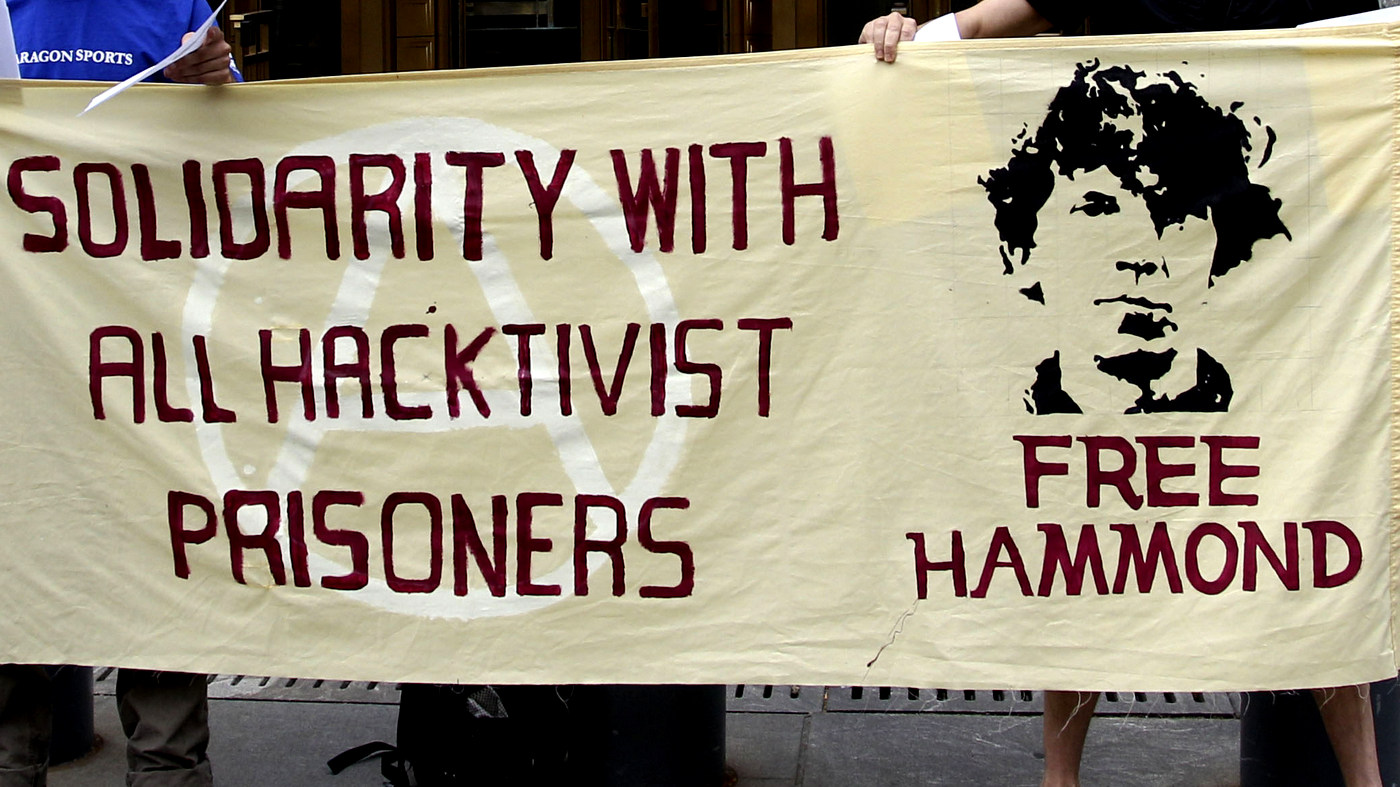 Protesters stand in front of the federal courthouse during the arraignment of Jeremy Hammond in New York, Monday, May 14, 2012. Photo: Seth Wenig/AP
Protesters stand in front of the federal courthouse during the arraignment of Jeremy Hammond in New York, Monday, May 14, 2012. Photo: Seth Wenig/AP
As a freshman at the University of Illinois-Chicago in 2004, Jeremy Hammond hacked into the computer science department’s website, exposing a security vulnerability. When he brought it to the university’s attention and offered to fix it, however, he was subjected to a disciplinary hearing and later expelled from the university.
A friend of Hammond’s told Rolling Stone that this experience taught Hammond “if you try to work with the system, they fuck you over.» Thus, Hammond set himself down a path of working for change outside that system, becoming a fixture of Chicago’s radical, anarchist activism community and the hacktivist world of Anonymous.
In 2013, Hammond was sentenced to 10 years in prison and three years of supervised release for what Wired describes as “a damaging, politically motivated computer intrusion” of Stratfor, a private intelligence firm providing geopolitical analysis to everyone from the Pentagon to the United Nations, and security services to major corporations like Dow Chemical and Northrop Grumman.
Hammond hacked into Stratfor’s servers in 2011. In addition to wiping out the firm’s files and databases, he stole 5 million private emails and 60,000 customer credit card numbers. WikiLeaks received the emails (which it continues to post as the Global Intelligence Files), while Anonymous got the credit card numbers, which it used to make up to $700,000 in donations to nonprofit groups.
This hack was spurred by Hector “Sabu” Monsegur, a former computer security consultant and Lulzsec member. The FBI tracked down Monsegur in May 2011, and Monsegur became an informant and agent provocateur, urging others, including Hammond, to carry out the Stratfor hack.
Hammond’s defense team tried to position him as a whistleblower working to expose the unsavory ties between private intelligence agencies and law enforcement. Yet prosecutors noted that this wasn’t Hammond’s first time at the rodeo: In 2006, he had been sentenced to two years in prison for hacking into the computer system of Protest Warrior, a right-wing group known for harassing anti-war groups. (Hammond was released after 18 months.)
His other hacking targets run the law enforcement gamut. According to Wired, they’ve included “the FBI’s Virtual Academy; the Arizona Department of Public Safety; Brooks-Jeffrey Marketing, Inc.; Special Forces Gear; Vanguard Defense Industries; the Jefferson County, Alabama Sheriff’s Office; the Boston Police Patrolmen’s Association; and Combined Systems, Inc.,” according to Wired.
At his sentencing hearing in November 2013, Hammond read from a prepared statement. He thanked his defense team and supporters, and explained his rationale behind using extralegal means to expose the injustice of the workings of corporations, government and law enforcement. Noting that his “acts of civil disobedience and direct action” were “in line with the principles of community and equality that have guided my life,” Hammond explained what motivated him to hack these particular targets:
“I targeted law enforcement systems because of the racism and inequality with which the criminal law is enforced. I targeted the manufacturers and distributors of military and police equipment who profit from weaponry used to advance U.S. political and economic interests abroad and to repress people at home. I targeted information security firms because they work in secret to protect government and corporate interests at the expense of individual rights, undermining and discrediting activists, journalists and other truth seekers, and spreading disinformation.”
Hammond, now 30, is scheduled for release in 2020. In an August 2014 interview with Al-Jazeera America, Hammond said he feels no remorse for his actions, and his only regret appears to be not going “underground” to do the kind of work he was doing.
He’s reportedly staying busy in the federal corrections center he’s been transferred to in Kentucky. He works in the laundry room, exercises daily, plays chess and softball, and studies Spanish. He considers his sentence a temporary inconvenience. He told Al Jazeera America, “Something they can never take, our determination, our principles, our passions. These things are more valuable than a temporary loss of freedom.”
Meanwhile, he’s busy making plans for the future, which he says will include “mayhem and mass havoc,” but not necessarily more hacktivism.
Thomas Drake
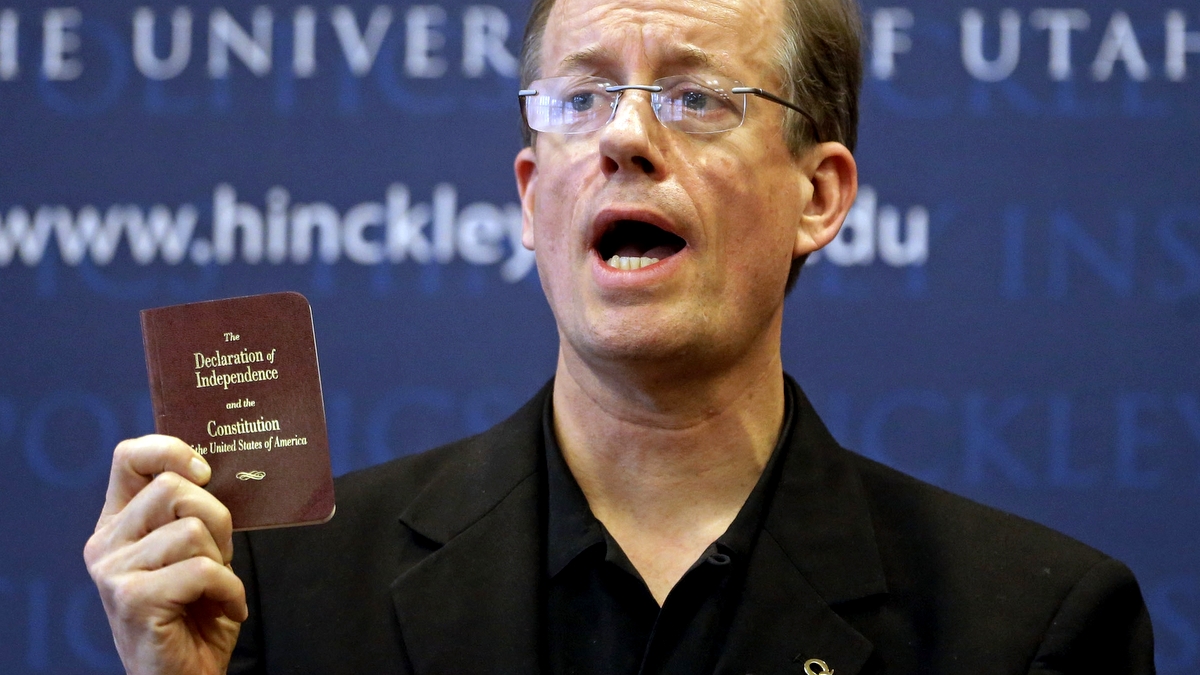 Thomas Drake, a former National Security Agency senior executive who leaked information to the media, addressees the University of Utah’s Hinckley Institute of Politics, Thursday, April 10, 2014, in Salt Lake City. Drake who was targeted in a government leak investigation said the country’s sweeping secret surveillance programs are violating Americans’ constitutional rights. (Photo: Rick Bowmer/AP)
Thomas Drake, a former National Security Agency senior executive who leaked information to the media, addressees the University of Utah’s Hinckley Institute of Politics, Thursday, April 10, 2014, in Salt Lake City. Drake who was targeted in a government leak investigation said the country’s sweeping secret surveillance programs are violating Americans’ constitutional rights. (Photo: Rick Bowmer/AP)
In 2002, the NSA sought proposals for a covert way to surveil and analyze email and cellphone traffic. Drawing on the input of a consortium of defense contractors, including Science Applications International Corp., Computer Science Corp., Booz Allen Hamilton, IBM and Boeing, the NSA came up with a proposal for an application and hardware suite capable of analyzing an electronic network in real time. The proposal’s name was “Trailblazer” and it represented an exponential jump in the intelligence community’s signal intelligence capability.
Almost immediately, complaints of gross waste, fraud, abuses and mismanagement started to be received by the Department of Defense’s Inspector General. Overcharging of contractor labor rates, failure to meet set timeline goals and a lack of managerial control led the project to cost more than a billion dollars and be years overdue. With many calling the program a “wasteful failure,” Trailblazer was shut down in 2006.
From its beginnings, there was an air that dissent or disagreement with the management of the project would not be tolerated. After learning that complaints were being filed against Trailblazer, then-NSA Director Michael Hayden sent out a memo to all NSA employees, stating that, “individuals, in a session with our congressional overseers, took a position in direct opposition to one that we had corporately decided to follow. … Actions contrary to our decisions will have a serious adverse effect on our efforts to transform N.S.A., and I cannot tolerate them.“
Despite the threats, the complaints continued. One of the individuals who complained the most was Thomas Drake, a decorated U.S. Air Force and Navy veteran and then-technical director for Software Engineering Implementation for the NSA’s Cryptologic Systems and Professional Health Office and Process Portfolio Manager for the NSA’s Directorate of Engineering. Drake was concerned that massive sums of resources were being funneled into a dubious project when the NSA already had “ThinThread,” a working surveillance prototype. ThinThread was better designed to avoid accidental surveillance of non-targets and was less the “dragnet” Trailblazer was designed to be.
ThinThread is the creation of mathematician Bill Binney. As reported in The New Yorker:
“As Binney imagined it, ThinThread would correlate data from financial transactions, travel records, web searches, GPS equipment, and any other ‘attributes’ that an analyst might find useful in pinpointing ‘the bad guys.’ By 2000, Binney, using fibre optics, had set up a computer network that could chart relationships among people in real time. It also turned the N.S.A.’s data-collection paradigm upside down. Instead of vacuuming up information around the world and then sending it all back to headquarters for analysis, ThinThread processed information as it was collected — discarding useless information on the spot and avoiding the overload problem that plagued centralized systems.”
ThinThread was discarded because NSA lawyers felt that the program’s anonymizing features were not adequate to satisfy federal privacy laws. Trailblazer, however, proved to grossly ignore the same privacy concerns that sunk ThinThread. Drake reported his concerns to both the House and Senate Intelligence Committees, and much of the Department of Defense’s Inspector General report came from information he provided.
Even though the result of this internal whistleblowing was a prohibition on the NSA starting or funding projects of a certain size, the public knew little about the agency’s actions. The Inspector General report, when released in 2004, was over 90 percent redacted, with the unredacted report under heavy classification. The NSA, the Department of Defense and the George W. Bush White House all actively denied knowledge of Trailblazer.
In 2005, Drake sent Siobhan Gorman of the Baltimore Sun emails concerning various topics, including Trailblazer. While Drake stated that he was careful not to give sensitive information — an argument defended in court in 2011, Gorman was still able to write a series of reports on Trailblazer, which caught the White House’s attention.
Bush ordered the FBI to determine who was responsible for the Trailblazer leak in 2007. Although the information the prosecution cited as being controlled was, in fact, unclassified and openly available within the NSA, the FBI raided and arrested Drake on the initial charge of retaining controlled information. Drake is only the fourth person in American history to face such a charge. By 2010, Drake was indicted on one count of willful retention of national defense information, one count of obstructing justice and one count of making false statements.
The government’s arguments ultimately collapsed and the prosecution agreed to drop all charges if Drake agreed to plead guilty to a single misdemeanor. Drake received no jail time, no fine and one year of community service and probation, but the misdemeanor conviction effectively made it impossible for him to continue in government service.
Stripped of his security clearance, Drake, now 57, found work at an Apple Store and founded Knowpari Systems, a consultancy. He is also an advocate against the surveillance state and was reportedly an inspiration to Edward Snowden. If asked, he is likely to say that he regrets nothing that happened to him, but one must ask whether what has happened to him is fair treatment for an employee who only wanted to file a complaint.
“I did not take an oath to support and defend government illegalities, violations of the Constitution or turn a blind eye to massive fraud, waste and abuse,” said Drake upon receipt of the Ridenhour Prize for Truth-Telling in 2011. He indicated that the oath he took to defend the Constitution “took precedence…otherwise I would have been complicit.”
Julian Assange
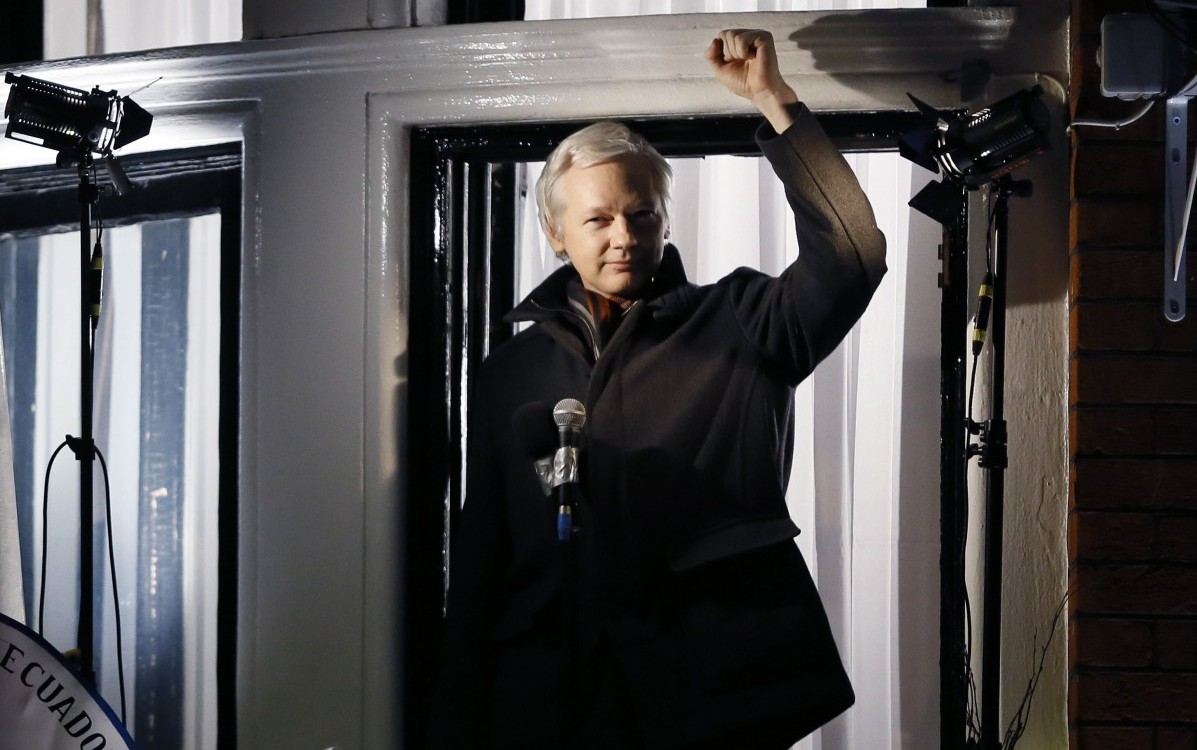 Julian Assange, founder of WikiLeaks gestures as he speaks to the media and members of the public from a balcony at the Ecuadorian Embassy in London, Thursday, Dec. 20, 2012. (Photo: Kirsty Wigglesworth/AP)
Julian Assange, founder of WikiLeaks gestures as he speaks to the media and members of the public from a balcony at the Ecuadorian Embassy in London, Thursday, Dec. 20, 2012. (Photo: Kirsty Wigglesworth/AP)
If one asked “What is the Obama administration’s boogeyman?” it wouldn’t be unreasonable to hear “Julian Assange” as an answer.
Assange is the self-described editor-in-chief of WikiLeaks, a database and website dedicated to the publication of anonymously-received news leaks and classified state documents started in 2006 by Iceland’s Sunshine Press. By June 2007, WikiLeaks claimed to have published over 1.2 million documents. Its current portfolio includes the Chelsea Manning leaks; the Guantanamo Bay leak, known as the Gitmo Files, which detail the treatment of detainees at the military detention camp at Guantanamo Bay in Cuba; the ongoing Stratfor email leak that started in 2012, known as the Global Intelligence Files; and the Syria Files, a collection of over 2 million emails from Syrian public officials to a number of private companies between 2006 and 2012, collected by the hacktivist group Anonymous.
To his critics, Assange is a self-aggrandizing publicity hound willing to publish critical state secrets and damaging personally-identifiable information simply to promote himself as a legendary journalist.
To his supporters, Assange represents the need to present the truth and allow the public to make their own decisions. Even though the man is flawed, to his supporters, his cause — shining sunlight into the darkest corners of corporate and government action and decision-making — is noble and worth continuing.
Yet there are doubts that Assange is the one to continue this crusade. With Assange wanted by the London Metropolitan Police on an extradition warrant to Sweden, Assange has taken asylum at the Ecuadorian embassy in London since June 2012. Assange is wanted in Sweden in connection with an investigation into sexual assault allegations.
Yet there is a concern that once in Sweden, Assange can be extradited to the United States, where he is wanted in regards to WikiLeaks’ participation in the publication of classified U.S. intelligence files obtained from security firm Stratfor and WikiLeaks’ facilitation of the downloading and publishing of the classified materials gathered by Chelsea Manning. This has made Assange fearful that turning himself over to Swedish authorities would only allow for his eventual extradition to the U.S.
The notion that Assange would be extradited on the request of the police without a judicial order in England has raised questions about whether Assange’s civil rights are being respected or if the British government is going along with the request simply for diplomatic reasons.
In a July 2014 interview with Democracy Now!, Assange said:
“[There’s] a lot of concern about this idea that you could extradite someone without even charging them. So, political pressure — there was a backbench revolt in the British Parliament, principally amongst the conservative backbench, that this was — you know, that any police officer in Europe could just ask for someone in the U.K. to be extradited without it going before a court and without them being charged. And so new legislation was introduced to prevent that happening. So, no more extradition without charge from the U.K. But there was then debate that, ‘Well, will this in fact protect Assange?’ And so, a specific clause was entered into it that it will not be retrospective for those people where the court has decided that they will be extradited, but they haven’t been extradited yet—which just applies to me.”
Swedish authorities seek Assange, 43, on questions concerning one count of unlawful coercion, two counts of sexual molestation and one count of lesser-degree rape against two women in 2010. No formal charges have been filed, and Assange denies these allegations.
With Metropolitan Police stationed around the embassy around-the-clock with orders to arrest Assange should he emerge, Assange’s health is deteriorating, in part due to sunlight deprivation and in part due to the fact that he is not allowed to leave the embassy to receive medical assistance. News reports have indicated that Assange has a severe vitamin D deficiency, chronic lung problem, cardiac arrhythmia and critically high blood pressure.
In November, Stockholm’s appeal court rejected a request by Assange’s lawyers to lift the arrest warrant against him. In the ruling, it was stated that, “There is a great risk that he will flee and thereby evade legal proceedings if the detention order is set aside. In the view of the court of appeal, these circumstances mean that the reasons for detention still outweigh the intrusion or other detriment entailed by the detention order.” Should Assange return to Sweden, he would be arrested immediately.
However, the appeal court did reflect its displeasure that the inflexibility of the prosecutor has brought this case to a standstill. This pressure from the court has suggested that the prosecutor may eventually question Assange in the London embassy, which the British Foreign Office has said it would “actively welcome.”
With Assange’s asylum limiting his movement, both his and WikiLeaks’ public profiles have diminished, even despite a failed run for the Australian Senate, multiple media appearances and a talk show on Russia Today (RT). But, as Assange’s publisher, Colin Robinson points out, it’s foolish to count out someone who has been the explicit enemy of the powerful.
As Robinson wrote for the Guardian in March 2014:
“[I]t is especially dangerous to pass casual judgment on the character of people who confront the powerful, because our perceptions of them are open to manipulation by those to whom they present a threat. This point is underscored by Glenn Greenwald’s recent publication of documents from the Joint Threat Research Intelligence Group, a hitherto secret unit within GCHQ [Government Communications Headquarters]. … Furthermore, another Greenwald report reveals that Assange and WikiLeaks have been the specific target of operatives in GCHQ and the NSA.”
 The Unsung Heroes Of WikiLeaks
The Unsung Heroes Of WikiLeaks
While Assange tends to get most of the press concerning WikiLeaks, it is clear he did not act alone. WikiLeaks’ success is due to a team of hardworking journalists and lawyers — all of whom received scorn and political scrutiny for their participation.
Sarah Harrison
Sarah Harrison at the 30th Chaos Communication Congress in Hamburg, 2013 (Photo: WikiMedia/CC)
It has been said that “behind every great man, there’s a great woman.” With Assange in a sort of self-imposed house arrest, a woman that previously maintained a low profile became the public face of WikiLeaks and a target for the international press. In doing so, she took on the same political scorn and risk that many others in WikiLeaks have been subjected to, and she may ultimately face the same condemnation and punishment as they have.
Sarah Harrison, 33, entered the public consciousness when she accompanied NSA leaker Snowden from Hong Kong to Moscow on behalf of WikiLeaks. As Harrison is not a lawyer, it raised eyebrows when she was chosen for the mission — especially considering that WikiLeaks had better qualified attorneys on staff, such as human rights lawyer Jennifer Robinson. Many speculate that Harrison got the role because of her closeness to Assange; it has been alleged that Harrison is Assange’s girlfriend.
Harrison has earned her stripes in WikiLeaks, despite her closeness with Assange. After a brief internship with WikiLeaks, she emerged as a strong legal researcher, participating heavily in the processing of the Manning files. She served as lead journalist for WikiLeaks’ Syria Files, conducted the news conference at the Frontline Club, and served as the media’s technical liaison — helping to explain to journalists how to work with the encrypted files on WikiLeaks. Currently, she is a section chief with the group.
Harrison stayed with Snowden in Russia for 39 days until he was granted temporary asylum. Due to the fact that a large number of the files Snowden leaked originated from the United Kingdom’s GCHQ, because Harrison actively helped Snowden flee justice, Harrison may be implicated under the U.K.’s Terrorism Acts. Accordingly, Harrison’s lawyers have instructed Harrison — a British national — that it is “not safe to return home,” and she is currently “exiled” in Berlin.
It is doubtful that Harrison regrets her fate. “When whistleblowers come forward we need to fight for them, so others will be encouraged,” Harrison wrote in a statement published by WikiLeaks. “When they are gagged, we must be their voice. When they are hunted, we must be their shield. When they are locked away, we must free them. Giving us the truth is not a crime. This is our data, our information, our history. We must fight to own it.”
Laura Poitras
 Laura Poitras poses for a portrait in New York. Poitras’ one-of-a-kind documentary «Citizenfour,» intimately captures Edward Snowden during his leak of NSA documents. (Photo by Charles Sykes/Invision/AP)
Laura Poitras poses for a portrait in New York. Poitras’ one-of-a-kind documentary «Citizenfour,» intimately captures Edward Snowden during his leak of NSA documents. (Photo by Charles Sykes/Invision/AP)
The strangest thing about Glenn Greenwald — the former Guardian freelancer who made his name publishing the Edward Snowden NSA leaks — and controversial film producer Laura Poitras, who had allegedly been on the Department of Homeland Security’s watchlist for years, arriving in New York last April to receive Long Island University’s George Polk Awards in Journalism, was that nothing strange happened. Despite calls from Rep. Peter King to have Greenwald arrested following the leaks, the two were able to leave the airport, attend the ceremony, and return home with no indication of opposition or oppression. There were no TSA security detentions, extended searches, questioning by law enforcement or even detectable “tailing” by federal agents while the two were in the U.S.
However, for Poitras, this temporary relaxation of what she has called “the climate of fear” does not mitigate the fact that the climate exists in the first place. The award-winning documentarian — who won a Peabody Award for “Flag Wars,” garnered an Academy Award nomination for “My Country, My Country,” and secured the Sundance Film Festival’s «Excellence in Cinematography Award for U.S. Documentary» for “The Oath” — became a monitoring subject of the federal government due to the George W. Bush administration’s opposition to “My Country, My Country,” which criticized American actions during the Second Iraqi War. According to Poitras, she has been placed on the Department of Homeland Security’s “watch list” and been told that her “threat rating” was the highest assignable by the department. She also suspects that National Security Letters have been issued to obtain her telephone and Internet records.
In the past, she has been stopped by border agents more than three dozen times, had her computer and cell phone confiscated, was threatened with denied entry into the U.S. — despite being a natural citizen of the nation — and subjected to detention and interrogation. This may be due to false allegations made while she was in Iraq filming. She had been accused of having early warnings of insurgent attacks, presumably so that she would be in the position to record such events. There is no evidence to support these claims.
“They took my bags and checked them,” Poitras told The New York Times. “They asked me what I was doing, and I said I was showing a movie in Sarajevo about the Iraq war. And then I sort of befriended the security guy. I asked what was going on. He said: ‘You’re flagged. You have a threat score that is off the Richter scale. You are at 400 out of 400.’ I said, ‘Is this a scoring system that works throughout all of Europe, or is this an American scoring system?’ He said. ‘No, this is your government that has this and has told us to stop you.’’
Despite this, she remains a passionate advocate for governmental accountability and transparency. It was possibly for these reasons that Snowden initially contacted Poitras. As it turned out, Poitras was actually Snowden’s second choice; Greenwald ignored Snowden’s emails to him. Despite initial hesitations, Poitras agreed to meet Snowden with her reporting partner, Greenwald, in Hong Kong. It was then that Poitras took custody of the downloaded “Five Eyes” files, changing her life forever.
Even though she could, theoretically, return home to the U.S. permanently, she does not feel safe producing her work in the country. So, she opts to stay in Berlin for the time being, occasionally visiting Greenwald in Brazil.
She has joined Greenwald with investigative reporter Jeremy Scahill to form the online magazine The Intercept, where she serves as an editor, and in May, she visited Snowden in Moscow. Her latest film, “1971,” concerning the 1971 Media, Penn. Citizens’ Commission to Investigate the FBI’s raid on the FBI offices, premiered at the Tribeca Film Festival on April 18.
For the 50-year-old former MacArthur Fellow, the loss of normality, however, may be the hardest pill to swallow. “Our lives will never be the same,” said Poitras. “I don’t know if I’ll ever be able to live someplace and feel like I have my privacy. That might be just completely gone.”
Jennifer Robinson
 Jennifer Robinson, director of legal advocacy for the Bertha Foundation and former attorney for WikiLeaks founder Julian Assange, walks into a courthouse in Fort Meade, Md., Thursday, June 7, 2012, for a pre-trial hearing for Army Pfc. Chelsea Manning. (Photo: Patrick Semansky/AP)
Jennifer Robinson, director of legal advocacy for the Bertha Foundation and former attorney for WikiLeaks founder Julian Assange, walks into a courthouse in Fort Meade, Md., Thursday, June 7, 2012, for a pre-trial hearing for Army Pfc. Chelsea Manning. (Photo: Patrick Semansky/AP)
In 2012, while attempting to fly home to Australia from London, Jennifer Robinson — who, at the time, was representing WikiLeaks’ Assange — was told that she was on a watch list requiring official approval before she would be allowed to return home. After eventually being allowed to board a flight for Sydney, she was told that the flight restrictions did not come from Australia. Robinson received confirmation that the Australian High Commission in London was not made aware of her movements by London authorities. Furthermore, as her passport was valid, she was free to re-enter Australia.
Although no other independent evidence exists to indicate where the prohibition came from, it has been speculated — primarily, by the use of the term “inhibited” to describe her status — that the restriction request came from the U.S. Department of Homeland Security. Considering that both the U.K. and Australia are part of “Five Eyes” — the signal intelligence alliance that lost a significant amount of classified material with the whistleblowing of former NSA subcontractor Edward Snowden — and considering that WikiLeaks and Assange played key roles in the leaks, it may never be definitively known who was behind the travel block. But the situation reflects the reality that anyone in Assange’s inner circle is a perceivable political target.
Besides representing Assange in his extradition hearings in London and advising WikiLeaks on the Chelsea Manning proceedings and the publication of the diplomatic cables leak, Robinson is a noted human rights lawyer. She has worked on developing a case for an Australian Bill of Rights and forming a legal option on crimes against humanity in Iran. As a member of the law firm Finers Stephens Innocent LLP, her casework includes advice concerning humanitarian concerns in post-war Iraq, determining the responsibility of the pope and the Vatican in the Catholic Church child sex abuse scandal, and challenging extraordinary rendition. Working with human rights lawyer Geoffrey Robertson, Robinson represented the first applicant before the newly-formed U.K. Supreme Court, where she helped to overturn reporting restrictions in the case Mohammed Jaber and Others v. HM Treasury (2010).
Possibly because of her international profile, Robinson has been targeted by both the U.S. Department of State and by federal contractors. «I’ve noticed people consistently sitting outside my house in the same cars with newspapers,» said Robinson to the Guardian. «I probably noticed certain things a week ago, but mostly it’s been the last three or four days.»
In a letter from the State Department, Robinson was improperly bracketed with Assange to assume that Robinson’s role in WikiLeaks was more than just a legal advisor, but a coordinator. The letter started, “Dear Ms. Robinson and Mr. Assange, I am writing in response to your 26 November 2010 letter to U.S. Ambassador Louis B. Susman regarding your intention to again publish on your WikiLeaks site what you claim to be classified U.S. Government documents.» As the State Department made no effort to separate Robinson by acknowledging the client-lawyer relationship, the letter — in reality — implicates Robinson in WikiLeaks’ actions.
This implication was further developed when it became known that the federal contractor HBGary decided to target her, along with Glenn Greenwald, in an attempt to undermine WikiLeaks. Assuming that WikiLeaks will fold without the support of Robinson and others, and that — when pushed — the targeted individuals will move to protect their professional interests over WikiLeaks, the proposal, named “The WikiLeaks Threat” and sponsored by the law firm Hunton and Williams and by Bank of America, would create a disinformation campaign that would bolster opposition to WikiLeaks and discredit the group. This tactic has been recognized as possibly illegal.
There have been no publicly-revealed attempts to oppose Robinson through government or political means since 2012, but this could change, considering Assange has indicated his intent to leave the Ecuadorian embassy in London “soon.”
Jacob Appelbaum
U.S. investigative journalist, software developer and computer security researcher with the Tor Project, Jacob Appelbaum, attends a hearing at the European Parliament building in Brussels, Thursday, Sept. 5, 2013. (Photo: Yves Logghe/AP)
The case of Jacob Appelbaum, the first known American member of WikiLeaks, is an unusual one. As Rolling Stone stated in a 2010 profile: “An anarchist street kid raised by a heroin-addict father, he dropped out of high school, taught himself the intricacies of code and developed a healthy paranoia along the way.”
Appelbaum came to prominence in the media’s consciousness when, on Dec. 28, 2013 at the Chaos Communications Congress, he presented documents leaked by NSA whistleblower Edward Snowden which showed that the NSA can covertly turn an iPhone into an eavesdropping tool. In what would be published in Der Spiegel and LeakSource as the NSA’s ANT division catalog, Appelbaum pointed out that the iPhone hack — codenamed “DROPOUTJEEP” — was one of 49 surveillance packages available to NSA agents to harvest electronic information from microprocessor-powered devices.
An anonymity and privacy advocate, Appelbaum has spent most of his professional career fighting against government oppression. Besides working with WikiLeaks, Appelbaum is a core member of the Tor (The Onion Router) Project, the organization that publishes and distributes free software designed to encourage online anonymity. A close confidant of Edward Snowden’s, Appelbaum is one of the select few that were given a copy of the Snowden disclosures.
Appelbaum co-founded the anarchist hackerspace Noisebridge, and his wide array of interests are represented in his work with Greenpeace, Kink.com, the Ruckus Society and the Rainforest Action Network. He has spoken extensively about spreading technology to disaster-hit areas as part of relief efforts. He also collaborated on the development of smart parking meters, the “cold boot” attack — in which the memory content of a computer is dumped onto a removable drive after the target computer is quickly cycled “off” and “on,” allowing encryption keys to be “lifted” from a computer — and SSL certificate authorities.
In 2013, Appelbaum delivered Snowden’s acceptance speech after Snowden was awarded the biannual Whistleblower Prize at the Berlin-Brandenburg Academy of Sciences and Humanities. He also contributed to Julian Assange’s 2012 book “Cypherpunks: Freedom and the Future of the Internet,” and has appeared with Assange in episodes of Assange’s television show, “The World Tomorrow.”
While Appelbaum reported being targeted by the U.S. federal government before his connection to WikiLeaks was revealed, it’s unlikely that Appelbaum’s association with Assange and Snowden has helped the situation. Appelbaum has been detained in airports on multiple occasions — including one highly-documented occurrence in 2010, when agents from the FBI, Immigration and Customs Enforcement and the U.S. Army spent three hours interrogating the hacker in the Newark, New Jersey, airport about WikiLeaks, the location of Assange and his opinion of the wars in Iraq and Afghanistan. Three of his cellphones and copies of his receipts were confiscated by the agents.
In 2010, a court order forced Twitter to disclose the account information of Applebaum and other WikiLeaks members. Twitter has successfully petitioned the court to unseal the order so that the affected account holders could be informed.
Like many other members of WikiLeaks, Applebaum currently lives in Berlin due to fear of repercussion by the U.S. government. Yet Appelbaum has grown to suspect that he is being watched in Germany. He has testified before the European Parliament that his partner has been surveilled by men with night-vision goggles as she slept.
«I don’t want to live in a world where everyone is watched all the time,» Appelbaum told Rolling Stone. «I want to be left alone as much as possible. I don’t want a data trail to tell a story that isn’t true.»
Chelsea Manning
Pvt. Chelsea Manning — formerly Pvt. Bradley Manning — is currently embroiled in a civil rights fight. Despite early reports that the military would pay for the initial stages of her gender reassignment procedure while she is incarcerated at the U.S. Disciplinary Barracks at Fort Leavenworth, Kansas, instead of allowing her to be transferred to civilian prison, Manning has indicated that the military has failed to offer her treatment for gender dysphoria.
This is despite the fact that outgoing Defense Secretary Chuck Hagel approved “rudimentary level of gender treatment” for Manning in July 2014.
Manning’s lawyers have indicated that they are prepared to bring the issue to court, if necessary. Manning has indicated that she was transgender “in secret” during her military service, and a hearing to determine whether she can grow her hair long and wear cosmetics is scheduled for this month.
While the military’s behavior matches treatment precedence for other prisons — which either do not consider gender reassignment surgery to be an essential medical need or only maintain the hormone supplementation that existed prior to incarceration — the failure to address Manning’s condition has created the impression that the military is seeking to punish Manning beyond her prison sentence. It also reflects an unwillingness on the part of the military to handle lesbian, gay, bisexual and transgender issues fairly, despite current policy.
Manning, who is facing 35 years imprisonment and a dishonorable discharge, was behind the largest single leak of classified material to the public. While serving as an intelligence analyst in Iraq, Manning downloaded and shared with WikiLeaks videos of the 2007 Baghdad airstrike and the 2009 Granai airstrike, 500,000 Army reports that would later make up the Iraq War Logs and the Afghan War Diary, and 250,000 American diplomatic cables. The disclosure of these files had a significant effect not just in the U.S, but globally. The response to the downloaded files is credited, for example, as being the catalyst for Arab Spring revolutions.
In the context of her upbringing, it would have been difficult to predict that Manning would have had such a strong impact on geopolitics. Born in Crescent, Oklahoma, in 1987, Manning grew up in her mother’s hometown, Haverfordwest, Wales, after her parents divorced. Both of Manning’s parents were alcoholics, and Manning’s sister served as her initial primary caregiver. Even though she was a high-achiever in school and an exceptionally bright child, her parents’ lack of interest forced her to be self-reliant and introverted. At age 17, Manning returned to Oklahoma to live with her father.
Manning’s childhood instability manifested itself repeatedly, eventually causing her to lose her job as a developer with the software company Zoto — a job she started when she was just 17. At times, Manning would “lock-up” — be lost in her thoughts, seemingly frozen. As reported by the Washington Post, Kord Campbell, Zoto’s co-founder, was impressed with Manning’s aptitude, but grew concerned with Manning’s “lock-ups” and suspected drug use. “I had to put on the emergency brakes, get out, walk around the car, open the door and touch him before he finally snapped out of it,” recalled Campbell about the time he tried to teach Manning to drive. Campbell later fired Manning.
With continued disturbances at home, including a fight with her stepmother over money that led to Manning being kicked out of her father’s home, a bout of homelessness and a long string of low-paying jobs, Manning’s father successfully lobbied her to join the Army. Besides hoping to get money for college, Manning hoped that being in the highly masculine environment of the military would help alleviate her gender identity issues. She was bullied in basic training and marked for discharge due to her tendency to fight back before being forced to re-do basic training after the discharge was revoked.
During her tour of service, there were several incidents that should have caused her classified clearance to be revoked. One was a reprimand she received for posting three YouTube messages to her friends in which she described the interior of the Sensitive Compartmented Information Facility where she was stationed. A second incident occurred during a counseling session, when she overturned a desk and damaged a computer after being told she would lose her personal day off per week for persistent tardiness.
At the time, however, the Army was critically short of analysts and Manning was allowed to go to Iraq — something that would ultimately have a major historical impact. As with the Snowden leaks, the total effect of these disclosures is difficult to calculate. But as Manning sits in prison, denied medical treatment and referred to identify with a gender she does not accept, the question of whether it was worth it may prove even harder to answer.
Jesselyn Radack
 Attorney Jesselyn Radack, Government Accountability Project, National Security and Human Rights Director, gestures during a news conference outside District Court in Alexandria, Va., Tuesday, Oct. 23, 2012, after her client, former CIA officer John Kiriakou pleaded guilty, in a plea deal, to leaking the names of covert operatives to journalists. (Photo: Cliff Owen/AP)
Attorney Jesselyn Radack, Government Accountability Project, National Security and Human Rights Director, gestures during a news conference outside District Court in Alexandria, Va., Tuesday, Oct. 23, 2012, after her client, former CIA officer John Kiriakou pleaded guilty, in a plea deal, to leaking the names of covert operatives to journalists. (Photo: Cliff Owen/AP)
There’s a saying that it only takes a moment to change a life. For Jesselyn Radack, that moment came on Dec. 7, 2001, when the young attorney — just two years into her tenure at the Department of Justice’s Professional Responsibility Advisory Office (PRAO) — received an inquiry about the ethics of interrogating a prisoner without his lawyer present.
The prisoner was John Walker Lindh, the “American Taliban,” who was captured as an enemy combatant during the early days of the Afghanistan War. He had participated in the Battle of Qala-i-Jangi, a prisoner-of-war uprising that saw all but 86 of the prisoners and one CIA agent killed.
Lindh, an American citizen, was entitled to have counsel available to him for all questioning, per the U.S. Constitution, yet the FBI wanted to question him without an attorney present. Unbeknownst to Lindh at the time, his father had secured a lawyer to represent him. Radack advised that the FBI seek the lawyer’s permission before addressing Lindh — a position supported by her superiors at the PRAO.
Despite Radack’s advice, the FBI questioned Lindh without his attorney being informed. It was later learned that when Lindh was read his Miranda rights, an ad-libbed portion was added to the part about his right to counsel: “Of course, there are no lawyers here.”
Shortly after giving her recommendation to the FBI, her supervisor — who had previously supported her recommendation — gave Radack an unsigned and unscheduled “blistering” performance evaluation in which Radack’s judgment on the Lindh case and other issues were criticized. Radack was advised to find a new job or the review would be filed in her personnel file. Prior to this, the PRAO had abruptly ended its involvement in the Lindh case — an unusual move, since cases in which the PRAO’s advice is discarded were typically monitored.
On March 2, 2002, while Radack was still employed with the Justice Department, the lead prosecutor for the Lindh case contacted Radack for all emails related to the case. She discovered that the printed hard-copies of the emails were missing. After receiving help from technical support, Radack was able to recover 14 email messages, which she gave to the prosecution. She also kept a copy at home, just in case they went missing again.
After leaving the Justice Department, Radack heard on NPR in June 2002 that the Justice Department never took the position that Lindh was entitled to counsel during his interrogation. Reasoning that the prosecution failed to turn over all of her emails to the court — in particular, the email stating her position on the interrogation’s ethics violation — Radack filed suit against the government. She also sent the emails to Michael Isikoff of Newsweek, which ran a story on the issue. Arguing that as an employee, she was intimidated by her boss, and that as a former employee, the court would rule she has no standing, Radack defended sending the emails to the press as her only remaining option.
Many feel that the emails are one of the factors that contributed to the collapse of the federal case against Lindh and led to the eventual plea deal of 20 years.
Unable to prosecute Radack for anything more than theft of governmental property — Radack was within her rights under the Whistleblower Protection Act to talk to the media, Radack says the Justice Department engaged in a campaign of revenge and sabotage. The Justice Department launched a 15-month criminal investigation against her, pressured employers to fire her after phone records between her and Isikoff were made available, challenged her unemployment benefits, attempted to get her disbarred in Maryland and the District of Columbia, placed her on the selectee portion of the Federal Aviation Administration’s Terrorist Watchlist, and withheld notice that the court did not find that Radack violated any order of the court with her disclosure for two years.
Despite all of this, Radack emerged as a leading activist in government accountability. She has defended many of the people featured on this list of truth-tellers and whistleblowers, including Edward Snowden, Thomas Drake and John Kiriakou. She currently serves as the director of National Security & Human Rights at the Government Accountability Project.


